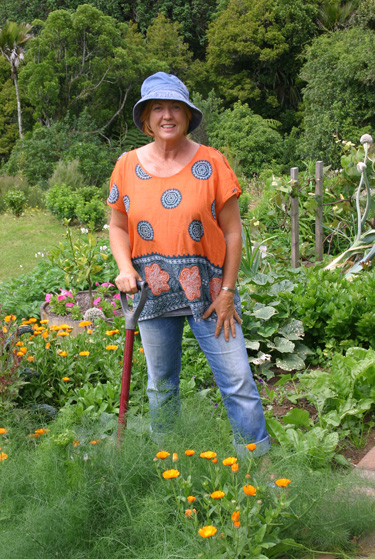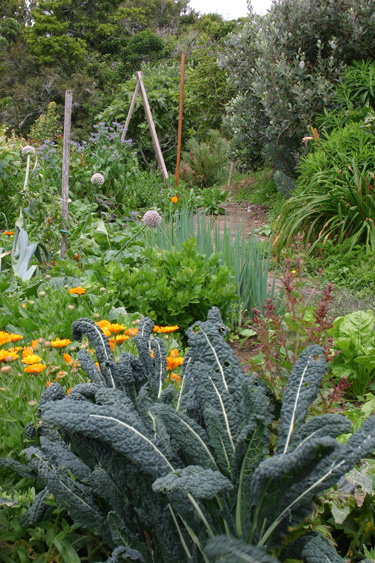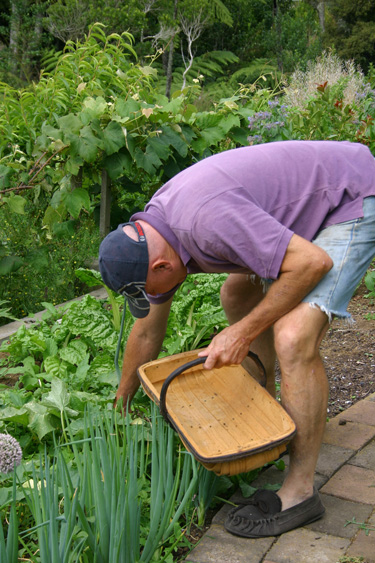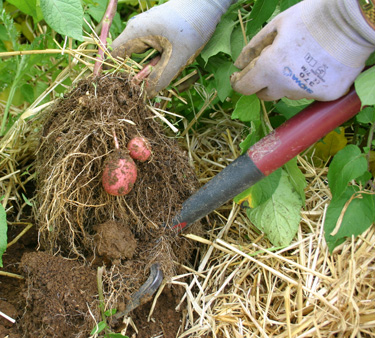Essential ingredients
When fresh fruit and veges are the order of the day, it makes sense to grow your own. Sue Linn talks to a gardener driven by her desire for top quality food.
Meryn Wakelin is mad about food. Friends and family rave about her cooking
and when there’s a family get together, it often ends up at Meryn’s place. Her famously creative cuisine draws on the traditional knowledge she absorbed while growing up on a Hawke’s Bay farm, and also the Mediterranean style cuisine she learned while living overseas.
Healthy food has always been a priority for this mother of three, but these days Meryn’s food is more than ever about health and wellbeing. An experienced naturopath, she is certain that most of our health issues can be traced to what
we eat. She and her partner Rob have adapted their eating habits to exclude commercially processed food. “Of course, there are always those times when you need to break the rules and enjoy a glass of wine or special dessert,” confesses Meryn, “but when we’re at home we only eat protein, healthy fats, fruits and vegetables. They also eat nuts, grains and seeds, but bread, flour, sugar and all other refined carbohydrates are absent from their shopping list. Rob, who has been through heart surgery in recent years, has lost considerable weight since following Meryn’s lead and changing his diet. However, she admits with a grin, “we’re both inclined to overindulge on those healthy fats sometimes.” Coffee with cream is a favourite treat but sugar is only for visitors - if they can find any.
The only carbohydrates Meryn and Rob consume are fresh fruit and vegetables. For that reason, their garden is a godsend. “Because we eat so many vegetables, it’s like having a grocery store on the doorstep - fresh organic vegetables at a moment’s notice. It’s so convenient!” says Meryn.
Living in the semi rural Bombay hills (south of Auckland), they try to avoid making special car trips for ingredients, besides which they find it’s not always easy to
buy locally-grown fresh produce, despite the market garden locality. Hence their vegetable garden is increasingly important. “I love it that I can wander down the path and choose what’s for dinner.” Built from recycled bricks by Meryn’s son Jack, the path has made the garden all the more inviting. It is accessed via spacious decks, built by Rob, that step down from the kitchen. Meryn has a panoramic view of her vege garden from the kitchen window. It flourishes on its north-facing slope, which Rob terraced with retaining walls to make flat areas for planting. With a keen artist’s eye, Meryn has created formal ‘potagers’ in previous gardens, but on this rural hillside with its native backdrop, an informal layout worked best.
Most days she loves the view of her ‘random wilderness’, where the weeds are so easily disguised. However “the fact that I have to look at it does make me get out there when it gets too unruly!”
Her garden looks very different from the ones she remembers from her childhood. “My father’s garden is my inspiration and I have lived my whole life presuming a vegetable garden was a given in every household. Everyone we knew had vegetable gardens. All were very organised, productive gardens that were deliberate and important. It was a matter of necessity.”
In contrast to those traditional gardens with their straight orderly rows, Meryn has planted a rambling garden including many edibles that grow semi-wild. “I’m so grateful for the plants that come up of their own accord. When I’ve been busy and not paying attention to my planting I can still come out here and find something.” Maori potatoes, NZ spinach, and red kale, to name a few, can almost always found. “The calendula is a great self-seeder too, lovely for colour and easy to pull out when you need the space.”
Citrus, figs, dwarf apples, pomegranates, grapes and other fruits grow on the slopes above and below the veges. Huge healthy rhubarb plants make striking accents, allowed to stay for their beauty alone, because they can’t be eaten without sugar.
The decks are home to an abundance of herbs. Containers are crammed with basil, parsley, oregano and mint. Spilling over the decks with their roots in the soil are fragrant rosemary, thyme, bay and other perennial herbs, indispensible in Meryn’s winter cuisine. It’s the herbs she’d most hate to be without. “Herbs are vital in cuisine and vital for our health. Its essential to me to always have a choice of fresh herbs in my garden.”
Nor would she want to be without fresh greens. Kale, silverbeet, NZ spinach, and cavolo nero are ever present, “a quick an easy side dish stir-fried together with butter, garlic and lashings of pepper.” Meryn’s favourite lettuce is Cos, “it’s the most nutrient rich lettuce and really juicy - great in smoothies.” She also grows red lettuces. “They look pretty, and I’ve also noticed that lettuces with some red pigment seem to get less insect damage than the green ones.”
Meryn plants with compost and organic sheep pellets. She uses as much straw mulch as she can get her hands on, to keep the weeds down and retain moisture. “This summer I’ve barely had to get the hose out. We seem to have just the right amount of rain.” Rainwater tanks serve both house and the garden.
It’s an idyllic semi self-sufficient lifestyle that suits this industrious pair. As well as delivering healthy food, it keeps them fit. ‘We’re lucky to have all this space” says Meryn, “but even if we downsize one day we’ll always want a garden.”
Meryn’s 5 top reasons to grow your own food
1. The fresher the better
Fruits and vegetables that are picked and eaten at the peak of their ripeness contain the most vitamins and enzymes. The longer they’re stored, the less nutrients they contain.
2. More dietary fibre
Vegetables are a major source of dietary fibre. The more we grow, the more we’ll be inclined to eat. Dietary fibre keeps us ‘regular’. Eating lots of fibre can also help with weight loss.
3. No food additives
Additives used in processed foods to enhance the colour, texture or taste have little or no nutritional value and interfere with healthy body function. There are no artificial additives in home grown veges. Plus if you grow herbs, you have can add amazing natural flavour to meals eliminating the need for artificial flavours and too much salt.
4. No toxic substances
Growing your own means that you know what does and does not go into your food and where it comes from.
5. Taste
The best tasting veges are the ones picked fresh from the garden. And when they taste so good, we eat more of them.
Visit Meryn at www.healnaturally.co.nz
24-Mar-2015

Meryn Wakelin




